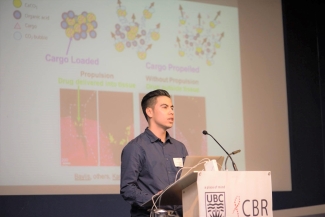Diverse talks that informed and inspired – Norman Bethune Symposium 2021
Friday, July 09, 2021 Dr. Basit Yousuf
The 10th Norman Bethune Symposium was held in May 2021. This annual Centre for Blood Research symposium honours the work of Dr. Norman Bethune, and features scientists and clinicians discussing hemostasis, blood transfusion and critical care. A virtual event for the second year, the symposium was attended by speakers and participants from across North America. Among them was Dr. Basit Yousuf, a trainee in Dr. Sandra Ramirez-Arcos’ laboratory, who is supported by a Canadian Blood Services Postdoctoral Fellowship award.

Canadian Blood Services and the Centre for Innovation are proud to partner with the Centre for Blood Research to deliver training and education events including the annual Norman Bethune Symposium.
Was this your first time attending the Norman Bethune Symposium? And did you present?
Yes, I attended Norman Bethune Symposium for the first time in 2021 and gave an oral presentation. The title of my presentation was “Transcriptomic analyses reveal strain-dependent enhanced capsule and biofilm formation in Staphylococcus aureus grown in platelet concentrates”
Tell me about the research you presented?
Platelet concentrate transfusions are an essential medicine to treat patients with bleeding disorders and cancers. However, platelet concentrates are highly vulnerable to bacterial contamination due to their pre-transfusion storage requirements. They must be stored at room temperature, agitated on a shaker. Under these conditions, platelets can be stored for up to seven days prior to transfusion. Staphylococcus aureus, an opportunistic notorious pathogen, has been reported to be one of the predominant bacterial contaminants in platelet concentrates. Canadian Blood Services screens all platelet products for bacterial contamination, but S. aureus occasionally escapes detection and causes post-transfusion septic reactions. These reactions can pose a serious risk to patients.
Our research question was to unravel how S. aureus evades immune defenses, escapes detection in our screening, and modulates platelet functionality in platelet concentrates. In this study, we spiked platelet concentrates with two S. aureus strains, CBS2016/05 and PS/BAC/317. CBS2016/05 is a strain that escaped platelet screening and caused a septic reaction after transfusion in an acute leukemia patient. In contrast, PS/BAC/317 was detected by our screening system. A technology called RNA-seq was used to explore the gene networks and pathways differentially expressed between CBS2016/05 and PS/BAC/317. Preliminary results revealed significant increases in expression of capsule and its positive gene regulators, biofilm and anaerobic metabolism genes in CBS2016/05 when grown in platelet concentrates. In PS/BAC/317, these genes were either expressed at a lower level or not differentially expressed.
These findings help us understand how and why CBS2016/05 escaped detection while PS/BAC/317 was detected. Capsule and biofilm are important virulence factors which play an intriguing role in the development of invasive and chronic infections and provide resistance against the immune response. Capsule is also a potent candidate vaccine target against S. aureus infections which are prevalent worldwide. Anaerobic metabolism (energy production in the absence of oxygen) is a characteristic of biofilm physiology and allows S. aureus to use alternative energy for growth and spread of infection. Moreover, cell wall anchor surface proteins which are involved in stimulating platelet activation and aggregation, immune response evasion and promoting biofilm formation were also highly expressed in CBS2016/05 platelet concentrates. These results have great significance to improving transfusion safety as we can use these factors as targets for developing new therapeutics against blood stream and device related infections or towards improving platelet additive solutions and platelet storage bags.
What was the most exciting thing you learned at the Symposium?
I found a talk by Dr. Richard Francis (Columbia University) most exciting. It was entitled “The effects of donor glucose-6-phosphate dehydrogenase deficiency on the red blood cell storage lesion”. This presentation gave me diverse perspective about blood storage and its impact on transfusion. I came to know glucose-6-phosphate dehydrogenase deficiency is associated with a decrease in the quality of red blood cells after storage. The data presented triggered some new ideas which I can try to implement in my ongoing metabolome research project, “impact of Staphylococcus aureus contamination on platelet functionality and consequently transfusion”. I am a molecular microbiologist currently focusing on microbiology aspects of platelet concentrate transfusion. Thus, I found most of the talks very enlightening and they gave me a broader perspective of how diverse blood research can be.
How did you find the online format vs. an in-person event?
I liked the online format. But I would always prefer in-person events. In-persons events always give us an opportunity to socialize, meet, collaborate, have fun and also travel/visit new places. In-person events freshen our mind.
Any other comments about your experience?
I really enjoyed whole symposium. There were diverse talks and I learned something new from every talk. I would like to express great appreciation to one of the speakers, Sharon Bulger (Vancouver), for ”Cameron’s Story”. She is an amazing person and I really salute her courage. I have always been pro-blood donor and she really motivated me to encourage others to donate.
Learn more about the 2021 Norman Bethune Symposium at the Centre for Blood Research’s blog: Norman Bethune Symposium 2021: Virtual Edition Round Two!
Canadian Blood Services – Driving world-class innovation
Through discovery, development and applied research, Canadian Blood Services drives world-class innovation in blood transfusion, cellular therapy and transplantation—bringing clarity and insight to an increasingly complex healthcare future. Our dedicated research team and extended network of partners engage in exploratory and applied research to create new knowledge, inform and enhance best practices, contribute to the development of new services and technologies, and build capacity through training and collaboration. Find out more about our research impact.
The opinions reflected in this post are those of the author and do not necessarily reflect the opinions of Canadian Blood Services nor do they reflect the views of Health Canada or any other funding agency.
Related blog posts
Postponed in April 2020, the Centre for Blood Research’s annual Norman Bethune Symposium moved to an online format and was held on Sept. 9, 2020. We heard from some Canadian Blood Services research trainees about the symposium and their experiences presenting their work in the “new normal” virtual format, which included a research showcase via Twitter.
The Centre for Blood Research’s symposium was held in Vancouver, British Columbia in April. Featuring talks from world-class researchers, trainees and patients, the Norman Bethune Symposium provided attendees with the perfect blend of information and inspiration.
On April 10th, 2018, the Centre for Blood Research presented its 8th Annual Norman Bethune Symposium. This event honours Canadian physician, Dr. Norman Bethune, who in the 1930s spearheaded the implementation of the earliest practical mobile blood collection and distribution systems. During his...

